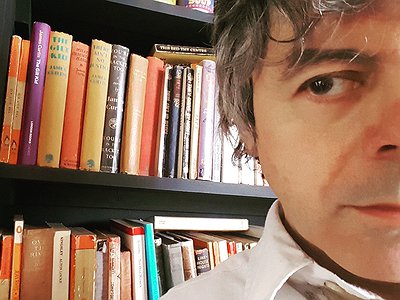Could you describe your creative process on the basis of a piece or album that's particularly dear to you, please? Where did the ideas come from, how were they transformed in your mind, what did you start with and how do you refine these beginnings into the finished work of art?
The process varies massively from piece to piece, but the track on Nightscapes of which I'm probably most proud is “Unwoken City”, and it's the one that came together most quickly and easily. I was experimenting by running an Omnichord through the Mellotron pedal, came up with an interesting sound and two chords that went well together, and soon after that recorded an improvised piece based on that. Then I did another one of similar length and decided that was the one worth using, so I left it at that. It was some while later that I trying running both takes simultaneously, and the results were perfect. When I came to rework the whole album for the Clay Pipe release, I left this track pretty much as it was – I knew if I tried re-recording it, I'd have been attempting to reproduce something instead of creating it in the moment, and it never could have worked as well.
There are many descriptions of the ideal state of mind for being creative. What is it like for you? What supports this ideal state of mind and what are distractions? Are there strategies to enter into this state more easily?
I need to either be given or give myself a goal; otherwise I find it hard to apply myself when there are displacement activities within easy reach. I can go months without feeling inspired to do anything creative, but when a project gets off the ground and the ideas start to flow, I'll be in my music room before work, after work… to keep the momentum up. One major distraction when relying on a computer to make music is, of course, the Internet – I know one can arrange to block it, but chances are I'll end up Googling some query re Logic…
How is playing live and writing music in the studio connected? What do you achieve and draw from each experience personally? How do you see the relationship between improvisation and composition in this regard?
For me, the two are quite separated in that I tend only to play live as part of a band, and not performing my own music. I am in the process or trying to organise a live performance playing music from Nightscapes, and the prospect is pretty terrifying; not just performance anxiety, but working out who, among the people who've very kindly agreed to play with me, will do what. I am planning to 'build in' some scope for randomness and improvising, to keep things interesting and fun for the players.
How do you see the relationship between the 'sound' aspects of music and the 'composition' aspects? How do you work with sound and timbre to meet certain production ideas and in which way can certain sounds already take on compositional qualities?
Often, it's playing around on a specific instrument or with a specific sound that drives the creation of a track. But where, say, I have a basic idea and then need a melody instrument, then the choice of that instrument is crucial, as is the actual sound I get out of it. It can involve a lot of trial and error. The track “The Years Fall Away” from Nightscapes went through dozens of versions – spanning several years! – where I just couldn't settle on the right melody instrument. Plus, for the backing I was trying to get that 60s-style ultra-compressed piano sound, and I didn't quite achieve what I was after, but I'm pretty happy with the final thing… to the extent I can walk away!
Our sense of hearing shares intriguing connections to other senses. From your experience, what are some of the most inspiring overlaps between different senses - and what do they tell us about the way our senses work? What happens to sound at its outermost borders?
At the risk of sounding like a lunatic, one thing I find when getting to grips with a musical part – a guitar or pedal steel figure, say – is that that part often takes on a kind of human-like persona; one with which I'm engaged in a combative relationship. It can be a friendly persona or a more aggressive, challenging one. I can't believe I'm the only one who experiences this – although I've never heard it described, and I'm not sure I've explained it very well…
Art can be a purpose in its own right, but it can also directly feed back into everyday life, take on a social and political role and lead to more engagement. Can you describe your approach to art and being an artist?
My music is essentially apolitical, and while personally I'm not that, I don't feel I have anything profound or useful in that way to convey through my music. I don't find music an especially interesting vehicle for that sort of thing. I'm just hoping to achieve some sort of emotional resonance in others.
It is remarkable, in a way, that we have arrived in the 21st century with the basic concept of music still intact. Do you have a vision of music, an idea of what music could be beyond its current form?
Hmmm… I'm quite wedded to those old-school virtues of 'playing an instrument'. But as I've described above, I'm not averse to using technology where it can really help achieve something out of my grasp. I just hope that whatever algorithms emerge, they allow musicians to recreate what's in their head, rather than channelling them along set paths that have more to do with the musical horizons of the programmers. (Disclaimer: I don't really know what I'm talking about.)


